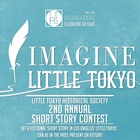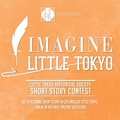Boyle Heights, 1940
“Hey Masao, where did you score those fine drapes, ese?”
“Over on Brooklyn and Soto. Manny Garcia’s uncle has a tailor shop there.”
“Órale pues, you’re lookin’ sharp, vato!”
“Thanks, Lil’ Joe, ay te watcho, catch you later, carnal!”
Yeah, Masao Imoto knew how to dress sharp alright. He was a Japanese American nisei zoot suitor, a pachuke, Japanese slang for pachuco. The older generation called them yógore “those that get dirty drinking and gambling hanging out at pool halls and picking up prostitutes.” Yeah, they were the bad boys of Boyle Heights and it was mostly all about partying and chicks. But for Masao, it was mostly about jazz, rhythm & blues. He played tenor saxophone and wanted to be a great jazz musician someday. Jazz was his mission. Jazz was his life. Jazz was his word.
Masao cast a long handsome shadow as he strolled down Soto this bright sunny day with his shiny neatly combed pompadour and ducktail haircut and sportin’ his fiiiine purple drapes: a broad-shouldered, fingertip zoot coat, pleated, pegged pants tapered at the ankles, a long gold watch chain, and a wide brimmed hat. As he strutted past the Paramount Ballroom on Brooklyn he saw a poster that blew his mind: “Tonight, The Count Basie Orchestra!” Man! Masao flipped out! Finally, he could hear a big band in person. He used to take the streetcar down to south Central Avenue where all the action was and stand in the alleys behind the nightclubs listening to the bands and play along with them. That was his training. That was his school.
The dark, loud, smoky ballroom was filled with mostly Chicanos, Japanese Americans, Blacks, and a few whites. Masao and his zoot buddies, Lil’ Joe Casillas and Isamu Imoto were there with their gorgeous pachuca girlfriends Chata and Rosie looking fine as wine and ready to shine with their stacked hair, heavy make-up, and fine drapes.
“Ladies and Gentlemen, please welcome the great Count Basie Orchestra!”
The room exploded in cheers as the band started blowing away with everybody jumpin’ and rockin’ and tearing up the dance floor.
“Lil’ Joe, you wait and see, ese. I’ll have a band some day and I’ll play in this ballroom.”
“Órale, Mas! Simón que si!”
A couple years later World War II exploded and blew Masao’s dreams to smithereens.
* * * * *
Masao sat staring out the window of the packed bus as it headed to Manzanar remembering that wild night at the Paramount. All he could bring was his saxophone and a small suitcase filled with records of the Count, the Duke, and Billie Holiday, and, of course, a set of his finest drapes. Isamu sat next to him. His parents sat silently behind them.
Everyone was quiet, numb, as the gun towers greeted them at the gates.
“Welcome to America…,” Masao groaned, “…land of the free. This is bullshit!”
“Yeah! We’re going to prison ‘cause we’re Japanese and that ain’t right!” Isamu shouted.
“Yeah, but don’t forget, ese, we are pachúke samurai and screw the U.S. government! They can take us out of Little Tokyo and Boyle Heights but they can’t take Little Tokyo and Boyle Heights out of us!”
“¡Oooraaaleeeh!” they yelled out together.
Masao and Isamu became heroes at Manzanar. The young prisoners dug their outrageous drapes and rowdy behavior. They taught them that being a zoot suitor was a way of getting back at the government for putting them there. Soon, zoot suitors spread through the prison like wildfire with drapes getting smuggled in and sold for cigarettes. Still, Masao struggled to keep his spirits up by playing his records all night and practicing all day. It became his only solace, his only escape.
“Hey Mas, you won’t believe it, ese, there’s a jazz band here called the Jive Bombers and they’re looking for a tenor sax player!”
“¡Óooralee! Awwwright!” Masao yelled out.
He joined the band and started playing at all the Saturday night dances. For a few hours the Jive Bombers and the prisoners felt free as the cold wind that blew through the thin tar-papered cabin walls as the suave pachuke bad boys chased and danced with the sweet sansei girls.
“Hey Isamu, guess what, ese? Tonight is my 26th birthday and I’m free from the draft! And to celebrate we’re gonna play Don’t Fence Me In real loud over and over until it drives the guards crazy. It’ll give ‘em nightmares for years!”
* * * * *
The war ended and Masao moved into Little Tokyo and got a job as a janitor at his hotel. It was now mostly an African American community along with a few Chicanos and Native Americans. It was known as Bronzeville.
One night Masao was listening to the radio:
“Ladies and Gentlemen, lovers of bebop jazz. Tonight ‘After-Hours at the Finale Club in Bronzeville’ will bring you the one and only Charlie Parker and his band!”
“Hey, Lil’ Joe!” Masao yelled into the phone. “Meet me at the Finale Club tonight on First and San Pedro. We’re gonna catch some crazy sounds, ese…bebop by the one and only Charlie ‘Bird’ Parker and some new guy named Miles Davis!”
Masao put on his fine midnight blue drapes and set out for the club. He barely recognized Little Tokyo as he strolled past Nishi Hongwanji Buddhist Temple which was now a Baptist Church. Lusty prostitutes reached out for him, car horns honked in heavy traffic, and the sidewalks were jammed while jazz blew and dripped through the thick noisy night air like hot molasses. By 1946 there were over 14 jazz nightclubs within a six block area. The scene rivaled the action down on south Central Avenue with Shepp’s Playhouse on First and Los Angeles featuring jazz greats T-Bone Walker and Coleman Hawkins. There were now over 75,000 people living in an area that used to hold 30,000. It was tight. Real tight, but it was alright for Masao as he strutted down First Street grinnin’ and spinnin’ his long gold watch chain. He was home. He was in pachúke heaven.
He arrived at the Finale Club and greeted Lil’ Joe, Isamu, Chata, and Rosie, and, as they climbed the long dark narrow stairs to the second floor Masao heard a woman’s voice that stopped him cold in his hot pachuke tracks. A voice so pure it instantly cut through his scarred soul. She was singing one of his favorite ballads by Billie Holliday, the heartbreaking I’ll Be Seeing You. He reached the top of the stairs and stood motionless, entranced by the soulful sexy siren. She was beyond beautiful. She was jazz incarnate. She was known as the Bronze Nightingale.
Charlie Parker then took the stage and dazzled the crowd with his flights of magical bebop madness. Then Miles took a solo. His playing was fluid and abstract, his tone, eerie, dissonant, yet deep, pure, and haunting. All that was cool and inspiring, but Masao was now only interested in the Bronze Nightingale. He said good night to his friends and headed for the bar.
“Hi, my name is Masao. Can I buy you a drink?”
“Sure.”
“You know, you sure can sing, Miss Nightingale. I could almost hear your life story. I could hear and feel the scars.”
“Thanks, baby. You can call me Charlene,” she said as Masao lit her cigarette. “Long story short, I came to L.A. from Kansas City, you know, to make it big someday. I wound up getting this gig here with a trio I put together. It’s cool. It pay’s alright.”
Charlene took a long hit on her cigarette as she checked out Masao.
“Say, if you don’t mind me asking… Are you…Japanese? I’ve never seen drapes on your people before.”
“Yeah, Japanese American, born and raised in Boyle Heights, right down First Street over the L.A. River. I run with Chicano pachuco cats. I got my style from them.” He ordered another round.
“Charlene, let me give you some background on this neighborhood. It used to be called Little Tokyo. It was the center of our community but it closed down when the war broke out. We were all kicked out.”
“Say what?”
“Yeah, the government thought we were a threat so they put us in concentration camps.”
“Man, baby, that is too cold! And I thought my people had it rough. My mama is Cherokee and my papa’s father was a slave.”
“Ah so, I see. Now I know where some of those scars come from.”
“So, what was it like in prison?” she asked.
“Luckily there was a jazz band there so I was able to keep my chops up. I play tenor sax. Yeah, well, the war and the nightmare of prison are all over now.”
They clicked their glasses and made a toast: “To freedom…to jazz.”
“So, what did you think of ‘Bird’ and Miles?” she asked.
“I respect both of their playing. Monster chops and imagination, but I’m more into cats like Joe Liggins and His Honey Drippers, you know, the rhythm & blues dance bands from south Central Avenue. I respect bebop and I play a little, but you can’t really dance to it.”
“Yeah…right. Hmm, I’ve got a feeling you can really blow, baby. Why don’t you bring your sax down tomorrow night and sit in with the band? Let’s see what you got.”
“Hey now, thanks, Charlene! Thanks a lot!” Masao finished his drink then said, “I need to hear you sing again. Can I walk you to your car after you finish tonight?”
“Sure, baby.”
Masao ordered another whiskey and dissolved into the Bronze Nightingale’s soul. He felt her pain and her joy as she radiated a sweet, gentle, yet, soulful power. That was the sound he wanted from his sax. That was the life he wanted: free, pure, deep, and true. And he wanted it with the Bronze Nightingale.
“You know what Charlene? As I listened to you tonight you reminded me of Billie Holiday. You both sing like strong birds with broken hearts. That’s the way I wanna play my horn.”
“Aww, that’s sweet, baby. That’s the nicest compliment I’ve ever gotten.”
“Well, Masao, it was nice meeting you and thanks for walking me to my car. See you tomorrow night.”
“Awreet, Charlene! We’re gonna jump, jive, and harmonize, esa! Just wait. We’re gonna blow the roof off, then…take off.”
“You’re too much, Masao. I dig you, baby.”
Masao practiced all night in an alley behind the Club Rendezvous playing along with Roy Milton and His Solid Senders. His sax sounded different. The Bronze Nightingale had brought something out of him…something wild, deep, sweet, and intense.
“Ladies and Gents, please welcome Masao Matsui. He’s from here.”
Masao confidently walked to the stage and blew the crowd away with his newfound soulful playing. There was some Parker, Miles, and a lot of the Bronze Nightingale coming through. The room was transfixed, then, jumped into the night in full flight.
“Hey, Mas? What happened, ese? You never sounded that good before!”
“I think I’m in love, Lil’ Joe. I think I’m in love for reals.”
Masao and the Bronze Nightingale became lovers bonded by their shared history of racism and their deep devotion to jazz. But Masao’s family, were opposed to the relationship and the entire nightclub scene. They wanted Little Tokyo back like it used to be.
“But you don’t understand,” Masao pleaded. “It’s all about the music. The music and Charlene make me feel like I’m somebody, somebody more complete, and free. Free from being an outcast. Free from being called a ‘Jap.’”
Masao eventually joined Charlene’s band and all was going good until one night some drunk yelled out “why is that Jap in the band?” Customers weren’t coming back so the owner fired them.
“Sorry, baby. I got an offer to sing in ‘Frisco.”
“What, you’re leaving? You can’t quit on me Charlene…on the band…on the music…our music.”
“Sorry, Masao, but I gotta go. Gotta work. Gotta eat. I’ll be back. I promise. Just keep playing that horn, baby, ‘cause that’s where I’ll be…in your music…in your horn. So play it sweet, you hear?”
“But I don’t want you in my horn, baby. I want you right here, in my arms…in my life!”
“Sorry, baby… Bye.”
She hugged him and gave him a soft kiss, turned, walked away, and got into a cab.
The night was cold, unusual for springtime. The cool air shivered as Bronzeville jumped and shimmied in its own hot bitter sweet jazz as Masao slowly walked to his hotel, his heart torn to shreds. He sat staring at his horn then after a few minutes and a few drinks slowly picked it up, fingered the keys, licked the mouthpiece, and blew out a torrent of pain. Then he stopped. He couldn’t blow from shaking.
Charlene never came back. Masao quit playing and started to drink heavily and got into a bad drug habit. He was dying and didn’t care. Music and life was too painful without the Bronze Nightingale.
“Mas, get up ese! You can’t die!” Lil’ Joe cried. “You gotta play! It’s in your blood, ese! Don’t you know we’re proud of you?! You’re our hero! You inspired me to take up the drums and now Isamu has taken up the bass! Let’s put a band together, ese! What do you say? C’mon! Get up Masao! Get up!”
Masao looked up at Lil’ Joe and Isamu with tears burning his eyes and slowly stood up trembling then mumbled, “Órale… Awright… Let’s do it.”
A few months later the Pachuke Boogie Boys were born and Masao got that dream gig he always wanted at the Paramount Ballroom. All the bad Boyle Heights zooters showed up resplendent in their fine drapes and proceeded to tear up the dance floor.
“Now we’re gonna burn this place all the way down with a new tune of ours!” Masao shouted.
“The Boyle Heights Boogie!” “Órraaleeh, Masaooo!” the audience yelled out.
Masao grinned proudly and waved back from the bandstand, swung his gold watch chain a couple times, then tore into a wild solo as the audience and the dance floor jumped and swayed to the burning beat.
While the crowd yelled for an encore, a woman across the dance floor slowly glided through the smoky ballroom like a flashlight shining through a thick fog. When she reached the bandstand, she whispered in Masao’s ear, “How about, I’ll Be Seeing You?”
The packed room went silent as she started to sing with Masao’s crying sax singing and wailing right along with her. It was glorious. It felt like some kind of church. The music filled everyone and everything in the room…with love…as it started to glow…then…rise.
Yeah…music can do that…especially if its pachuke jazz…rhythm, and blues…by Masao…and the Bronze Nightingale.
*This story was one of the finalists in the Little Tokyo Historical Society’s Imagine Little Tokyo Short Story Contest II.
© 2015 Rubén Funkahuatl Guevara





